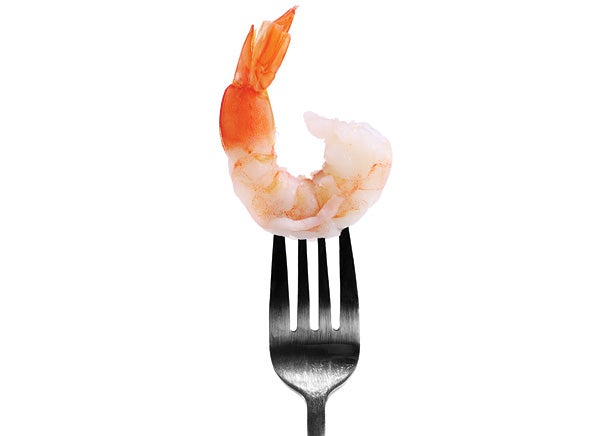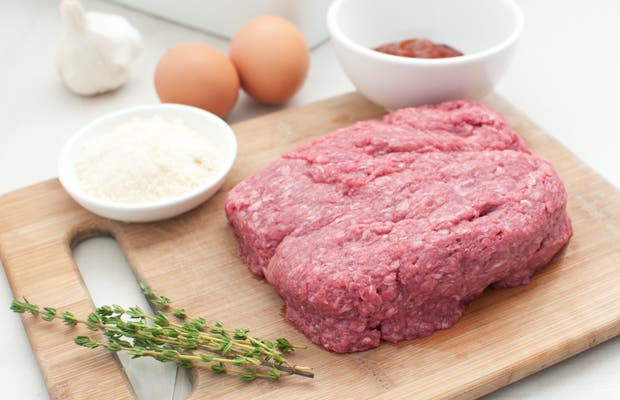10 Chicken-Free Muscle-Building Meals


1. Shrimp
4 oz = 24 g of protein, 112 calories
- For very few calories, you get an incredible dose of selenium – 64% of your Daily Value (DV) from this antioxidant enzyme, which works to attack post-workout free radical damage that can lead to injury.
- Get 12% of your DV of zinc, which works to support the health of your immune system, appetite control and may help delay premature aging of muscle tissue and skin.
- Because of it’s unusually low fat content – a serving contains less than a gram of fat – shrimp can help you build muscle without gaining excess fat.
- Shrimp is a good source of heart-protective omega-3 fatty acids, noted for their anti-inflammatory effects and potential to improve cholesterol and triglyceride levels, which can reduce your risk of coronary heart disease.
Protein-Packed Pita: Chop up shrimp, celery and onion and mix with 1 tbsp low-fat mayonnaise and a bit of mustard. Serve in a whole wheat pita lined with lettuce.

2. Tofu
4 oz = 9 g protein, 85 calories
- Unlike other plant protein sources, such as nuts, soy protein contains all of the essential amino acids needed for muscle growth. It also has a high Protein Digestibility Corrected Amino Acid Score (PDCAAS), which is the most accurate measurement of a protein’s digestive quality (egg whites are the gold standard). Translation: Soy is a fast-acting muscle-builder.
- Isoflavones are unique antioxidants found in soy that have anabolic effects and aid in repairing damaged muscle tissue after weightlifting.
- Soy protein can also aid in weight loss. Research shows that including soy-based foods in a reduced-calorie diet can significantly decrease unhealthy cholesterol levels and it has a greater effect on reducing body fat than cutting down on calories alone.
- Recent research found that soy protein might help decrease breast cancer risk and even breast cancer recurrence.
Preworkout Shake: Blend 4 oz silken tofu + 1 cup calcium-fortified orange juice + 1 ripe banana + 1 cup of berries until smooth.

3. Eggs
1 large egg = 6 g protein, 75 calories
3 egg whites = 10 g protein, 50 calories
- Eggs deliver a concentrated source of the branched-chain amino acids needed for muscle repair and rebuilding.
- Each egg yolk contains 1126 mg of choline – roughly one quarter of your daily value. Choline has been found to reduce systemic inflammation, a condition linked to a number of medical maladies, from heart disease to type 2 diabetes. It is also a key component of acetylcholine, which is the body’s primary chemical means of communicating between nerves and muscles.
- One egg contains more than 20% of your DV of tryptophan, an essential amino acid said to elevate the feel-good brain chemical serotonin and the sleep-aid chemical melatonin. And as you know, quality snooze translates into maximized muscle gains.
- One whole egg provides up to 15% of your DV of iodine, a trace element that is essential for good thyroid function, which keeps your metabolism in check. Iodine also helps your body utilize calcium efficiently.
Muscle-Up Breakfast: Scramble 1 egg + 3 egg whites + green onions + canola oil. Fold into a corn tortilla with heated refried beans and salsa.

4. Turkey
3 oz = 26 g protein, 110 calories
- Turkey, the other protein-packed bird, contains fewer about two grams less fat than chicken.
- One serving provides double immunity protection with both protein and iron. Protein is a key building block not only for muscle tissue but also for immune defense cells and iron, which boost immune function and the body’s ability to fight off infections – one serving has 1.3 mg of iron (the DV is 18 mg a day).
- Get many of the B vitamins, which are essential for energy production and cardiovascular protection.
Postworkout Sandwich: 2 slices of deli turkey breast between two slices of whole-grain bread + 1 avocado slice + onions + grated carrots + 1 tsp mustard

5. Salmon
4 oz = 29 g protein, 207 calories
- Salmon is one of the few dietary sources rich in vitamin D, which has garnered rock-star nutrition status. Long known as being essential for healthy bones and teeth, research is also beginning to show that vitamin D can help boost athletic performance and reduce levels of depression. Sockeye salmon contains the highest dose of vitamin D with 739 IU while chinook has 411 IU.
- One serving provides almost 90% of you’re the current recommended daily value of omega-3 fatty acids, which have been shown to reduce stress levels and aggression, lower blood pressure and triglyceride levels (a form of body fat) and provide significant cardiovascular benefits. Additionally, omega-3s promote blood flow – crucial for training and recovery.
- Containing nearly 60% of your DV of vitamin B3 (a.k.a. niacin), salmon helps your body metabolize all the macronutrients – carbs, proteins and fats – efficiently. Vitamin B3 also helps in the production of sex hormones, which play a role in maintaining anabolic conditions.
- Just four ounces gives you more than 50% of DV of vitamin B12, which is essential for the production of red blood cells (oxygen-carrying cells). Vitamin B12 also keeps your immune system strong to withstand your regular weightlifting sessions.
Muscle-Making Dinner: Brush salmon fillet with 1 tbsp olive oil + 1 tbsp lemon juice. Bake at 450 F for 10 to 15 minutes. Season with pepper. Serve with leafy greens and olive oil vinaigrette.

6. Whey protein powder
One scoop (about 22 g) = 16 g protein, 80 calories
- As one of the two prominent proteins found in milk (the other is casein), whey is among the few proteins that get absorbed by the body rapidly. It has an ideal array and proportion of amino acids, which work to elevate your mood, assist with muscle recovery and growth and even enhance your body’s ability to burn fat.
- Whey is one of the richest sources of leucine, isoleucine and valine – collectively known as branched-chain amino acids (BCAAs), which your body needs during hard training and after a workout. Unlike the other amino acids, BCAAs are taken up immediately by skeletal muscle, bypassing liver metabolism.
- Whey helps your body produce glutathione, an antioxidant that protects against free-radical damage, pollution and assorted toxins.
Postworkout Shake: Blend 1 banana + 1 scoop whey protein powder + 8 oz skim milk + 1 tbsp cocoa powder.

7. Beans
1 cup = 15 g protein, 225 calories
- Red, black, navy, lima, pinto – take your pick. They’re all low in fat and packed with lean muscle-building protein, cholesterol-lowering soluble fiber and iron.
- A cup of cooked beans can pack up to nearly as much calcium as half a cup of milk. Beans are also a good source of magnesium – about 24% of your DV. Both of these nutrients work in tandem to build strong bones and aid muscle contraction.
- With just around a gram of saturated fat or less per serving, you can loop out a ton of saturated fat from your diet by replacing a meat-based meal with a vegetarian bean dish a few times a week.
Vegetarian Muscle Meal: Saute red beans + olive oil + garlic + thyme + sage + ground cayenne pepper. Serve with warmed, precooked brown rice.

8. Low-fat Yogurt
- 8 oz = 12 g protein, 140 calories
- As you know, dairy is a rich source of bone-building calcium. What you may not know is that higher dairy intake is associated with lower body-fat levels, partly thanks to dairy’s high concentration of the amino acid leucine.
- Plain low-fat yogurt is a good source of energy-boosting zinc, vitamins B12 and B5 and a trace mineral called molybdenum that helps detoxify your body.
- Probiotics, a.k.a. “good bacteria,” are what makes yogurt a nutritional powerhouse. They prevent and treat gastrointestinal problems, such as constipation, diarrhea, bloating, and gas – factors that may occur at the onset of starting a clean diet. Look for the words Lactobacillus and Bifidobacterium on yogurt labels, as these are the specific strains (there are millions!) that research shows are most beneficial to active people.
Guilt-Free Dip: Mix 8 oz of yogurt + 1 tsp parsley + 1 tsp cilantro + 1 tsp chopped onion + ½ tsp celery salt. Chill in the fridge for 1 hour. Use as a dip with carrots, celery and bell peppers.

9. Flank Steak
3.5 oz = 23 g protein, 190 calories
- Thanks to its relatively low level of fat – a 3 ounce serving contains three grams of saturated fat – digestion of the protein will not be slowed as is the case with fattier cuts of beef, and that means faster delivery of amino acids to your muscles.
- One serving delivers 32% of your daily value of zinc, a mineral that is important in energy metabolism, particularly during exercise. Zinc is also essential to your muscle-recovery process post-training.
- Three and a half ounces of flank steak provide 27% of your DV of vitamin B12, which plays a vital role in the formation of red blood cells, the body’s primary delivery mechanism for oxygen. Additionally, vitamin B12 helps the body maintain the integrity of the nerve sheaths, which are comprised of the protein myelin. A functioning nervous system means better signal transmission during workouts.
- Slicing Tip: Cut flank steak on the diagonal to sever much of the tough connective fibers. Marinating flank before broiling or grilling will further tenderize it.
Lean Cuisine: Stir-fry flank steak with 1 tsp canola oil + 1 cup sliced red bell peppers + 1 cup broccoli. Serve with ½ cup cooked brown rice.

10. Bison
4 oz = 31 g protein, 190 calories
- Bison (buffalo meat) has all the taste of beef with less fat and cholesterol than all other meats. This is due to the biological attributes of buffalo: They don’t put fat in their muscles, which results in more protein and less fat calories per pound. Bison has two grams of fat per 100 grams, compared to four grams for skinless chicken breast.
- Since buffalo are fed with grass, researchers have found that bison meat contains high levels of conjugated linoleic acid (CLA) and healthy fats, both of which can cut the risk of cancer, diabetes and heart disease – and also aid in postworkout muscle recovery.
- Bison meat provides an impressive array of B vitamins, which work to protect the functioning of nerves, hormones, adrenal glands and the brain – crucial factors that will keep you on top of your fitness game. One serving gets you 41% of the DV for vitamin B12, 14% for B6 (used in protein metabolism) and 10% of B3 (niacin), which boosts energy and fat breakdown.
- Cooking Tip: Because bison lacks the marbling found in other red meat, use lower cooking temperatures and a shorter cooking time; overcooking will make it less juicy.
Skinny Steaks: Heat grill to the highest possible temperature. Season bison steaks with a pinch of sea salt and ground black pepper. Grill for about 3 minutes on each side. Serve with baked yam and steamed greens.